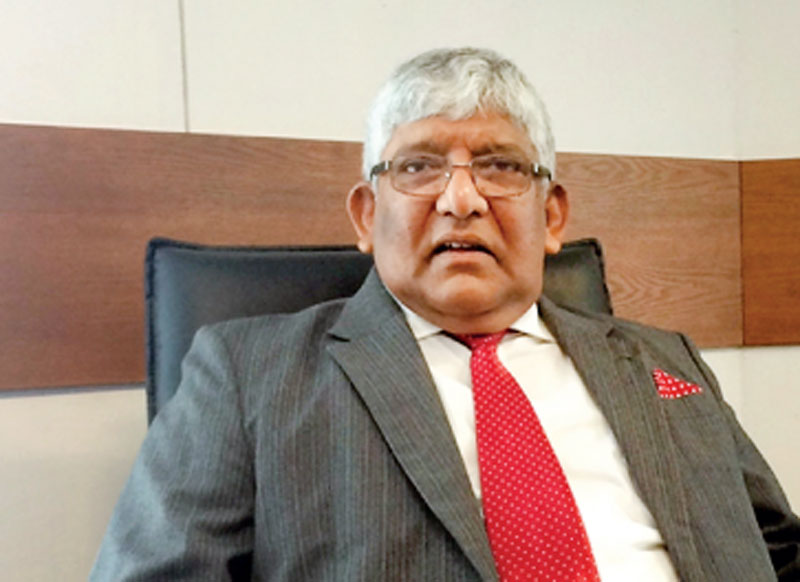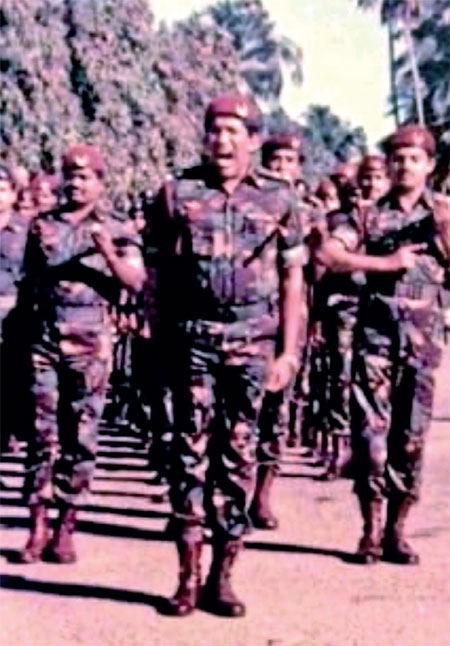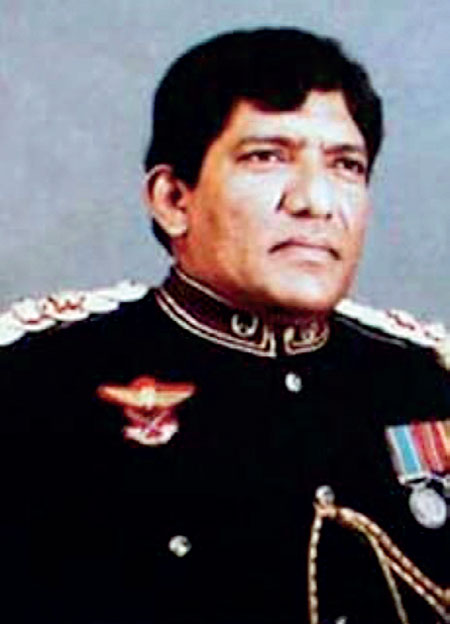Wednesday Feb 18, 2026
Wednesday Feb 18, 2026
Friday, 10 December 2021 00:26 - - {{hitsCtrl.values.hits}}

Lt. Col. Sunil Dayalan Peiris
|
 ‘First, they ignore you, then they laugh at you, then they fight you, then you win.’
‘First, they ignore you, then they laugh at you, then they fight you, then you win.’
So said Mahatma Gandhi; the architect of India’s freedom from the British looking back on the journey to freedom from oppression to which he gave leadership along with few like-minded. An extraordinary tale of transformational leadership in recent history. Another example is the three-decade PM of Singapore Lee Quan Yew who made Singapore a first world country from third world sufferings; again after being occupied by predators.
Examples of transformational leadership are few. The reason being contemporary leaders be it in politics or business, sports or military focus more on transactional dealings and leadership which is more a give and take approach. Few are the souls who venture beyond to facilitate a holistic and higher level of elevation and achievement for the team, the cause and the leader by bringing in transformation.
A modern-day epic example of transformational leadership can be found in the book ‘My journey with the commandos’ by Lt. Col. Sunil Peiris, retired military officer known as the ‘Father of the Commandos’. It is to him that the gigantic responsibility of forming a ‘special force’ to counter anti-aircraft hijack and terrorism was entrusted by the then Prime Minister late J.R. Jayawardena. It was done as required and beyond. The Commando Brigade today stands testimony to that. In his book the Colonel tells the long journey of its birth which is a true lesson in transformational leadership that anyone with an inquiring, inquisitive, probing and intellectual mind must savour. My task is a review of this book highlighting the essentials of transformational leadership traits so visible in this narration which would be of use I believe to those seeking inspiration to lead and govern.
 Clear vision and focus
Clear vision and focus
Having been commissioned in the SL Army in August 1969 as second lieutenant in the 1st battalion of Gamunu Watch Sunil Peiris hereinafter referred to as the author, rises to the rank of Captain by 1977. It is at that time the Commander of the Army late Gen. Denis Perera, recommends to the then PM Capt. Sunil Peiris as the ‘exceptional officer’ that the PM is looking for, to form a ‘special counter hijack anti-terrorist task force’ in the army to counter possible threats to the proposed national airline to be formed succeeding ‘Air Ceylon’ as Air Lanka. Concerns fuelled by the debacles of Entebbe and Munich. The brief was given, and Captain Peiris was asked to plan and initiate the project from scratch.
The author recounts how perplexed he was with this task given out of the blue; yet how he envisioned the mission, goals and objectives of the unit and the supporting organisational structure as he thought fit not looking for the next couple of years but into the indefinite future with designs for a bigger role for this ‘squadron’ in the country. Without formal learning on forming such a unit he says he relied on his reading and officer training received locally and overseas; inspired also by movies watched of special forces operations and legitimate stories he was privy to.
It is pertinent to mention here that the author dreamt of a future. Beyond the task at hand. His design of the organisation structure, the staffing, the training and the infrastructure he envisaged did not get blanket approval or cover at once but each painstaking stage by stage he built on his dream from the day the training started for the first batch of 29 ‘volunteers’ to the ‘special squadron’ in February 1978, till the day this unit was named ‘Commando squadron’ and thereafter progressing, expanding and being recognised as a fully-fledged Regiment in July 1986 with 800 plus men and 36 officers.
It is the clear vision and focus that opened doors for the commandos to get their own identity, skills and specialist training, a home with training facilities, modern weaponry and the capacity and motivation to be ‘six inches above ground’ than the rest in the military amidst countless challenges.
 Passion and conviction
Passion and conviction
The author speaks of the midnight oil he burnt in planning the formation of the squadron. The tactful yet forceful approach he displayed with the commander downwards in getting what he wanted approved through the maze of military administrative red tape. Particular mention must be made of the initiatives he took to model the commandos in appearance, training, spirit and character including special recognition and compensation for men, developing the motto ‘Nothing Impossible’ which stands to date.
The specialist paratrooper training from Indian Army, and anti-hijack and counter terrorism training from the British Army Training Team ensuring that the commandos were a class above from the rest ready to face any contingency are icing on the cake. He also speaks of his personal challenges and tragedies along the way – the loss of his younger brother top air force officer Wing Commander Eksith Peiris whilst on duty and health issues of his wife which he managed and prevented from being deterrents to the cause. His passion and deep conviction made it all possible underpinned by the positive attitude which is in his DNA.
Strength of character and courage
The author’s factual narrative sans boastful commentary clearly depicts his strength of character and courage. The opposition he faced from friends and colleagues in rank and file in setting up the commandos, circumventing the bureaucracy of the army and making his case with the respective commanders and the commander in chief himself to get what he wanted, expanding the force from a mere unit to a squadron and a regiment to which soldiers aspired to join, refusing to send his men as cannon fodder when the political and military leadership thought of ‘ trying out’ commandos amidst unrealistic odds; at the cost of reprimand is laudable.
In the final chapter he talks about how he refused to follow unethical and inhuman orders from a ‘senior government official’ to slaughter some ‘suspects’ of social unrest in the south – which eventually led to his resignation keeping his head high than to cow down to petty retarded and narrow political hegemony. A resistant and persistent soul to the core. How many of us would have the gall to do so in present times? Or even back then?
Communication
The author displays his talent for effective communication in his first formal attempt at authorship. No question about it. More importantly the book displays how focused and effective his communication has been. The commander requested him in the beginning to ‘rope in’ suitable volunteers and nominees from the Army’s teeth, arms or fighting units. He had to market the proposed unit and its cause. He had to make people leave their mother units and try their hand in a new unit without yet a clear direction. Amidst questions on their career progression, seniority and stability.
This the ‘captain’ achieved with his piercing focus, the booming voice, the charming persona, motivating delivery and entertaining satire... not to mention the appealing attire described in the book. He talks about the numerous times he had to brush off opposition and pointless ‘spokes in the wheel’ with the art of asking people to go to hell so diplomatically that they ‘practically asked for directions!’ Indeed. Sunil Peiris is a gentleman never at loss for words, wisdom, humour and context.
Team building and an eye for talent
Captain, Major and lastly at retirement Lt. Col. Sunil Peiris, or ‘The Boss’ as he was always affectionately called, had an eye for talent. From the word go where he set out to form the ‘special unit’ first by forming an initial task team, to the training team and to each and every intake of officers and men during his tenure he chose those he saw as people who make things happen. His choice of officers leading special operational platoons and were spot on! This is why during the incipient stages beyond his time as well the commandos always stood out as a force to be reckoned with and a terror to the enemy.
Special mention must be made of officers in the calibre of ‘Captains’ Sarath Handapangoda, Piyadi Chandrawansa and Vijitha Wlikala (later retiring as Colonel, Maj. Gen. and Major respectively), and non-commissioned officers in the likes of Regimental Sergeant Major Collin Silva Warrant officers Sudesh Parakrama and W.M.P.K. Fernando, Sergeants Dharmasen and Samarasinghe, Copral Wijesiri who played pivotal roles in the establishment, expansion and operational success of the commandos over time under and beyond the authors command.
They were handpicked by the Colonel. The contribution by the commandos in the liberation of motherland from the northern terrorists is on record and the accolades are many. A team is strong as its weakest link. Our author did not leave room in his team for any weak links. He on boarded the right people, nurtured and motivated them, equipped them and guided them. They either had to perform or depart. Such was the ‘team blueprint’ of the ‘Maroon Berets.’
Ability to think differently
The author can be seen as an individual who had the ability to see and think outside the box. If the box ever existed for him! He saw opportunity where others would see threats. He saw the future when some of his colleagues lived in the past. He saw challenges in adversity both from within and outside. His philosophy of ‘do the right thing and be damned’ ensured that the cause of the Commandos and the needs and objectives of the country transcended politics and villainy. At least during his time. His foresight paved the way for the commandos to be Brigade it is today with many feathers in their caps.
Hands on and attention to detail
The stories of operational engagements the author relates of fighting the enemy and the numerous hard training initiatives that were launched had his participation in full! From planning to execution. He led from the front; he went into every detail and eventuality. To ensure meticulous execution. Cases in point are taking the first plunge from a parachute during training in India and the very first para display locally, becoming the first ever Sri Lankan Paratrooper and the counter terrorist operations such as Annacottai, Punkudathivu, Manalkadu and Uththaraipuram which ensured its prime objectives of annihilating the enemy with minimum losses to the Commandos.
Discipline
The author’s commitment to discipline is exemplary! Both with self and others in the team. He ruled with an iron fist in a velvet glove. Firm but fair. Tough but not abrasive. If not for the discipline he instilled, the output he achieved nor the achievements through the Commando regiment subsequently could not have been possible. It takes iron discipline to bear arms, best in class at that, go through hardships, suffer physical and mental trauma and yet not pull the trigger needlessly or aimlessly at times of war and in times of peace. That’s the discipline of the Commandos.
It is enlightening to read how the author disciplined a guard post soldier for not firing to kill two ‘intruding civilians’ who crashed through the Ganemulla Camp entry barrier not heading calls to halt! Shoot they did but missed. The identity and lives apart, they failed to prevent a breach by unauthorised elements. Such is the man’s practical logic. The final episode in his journey with commandos is a sad and ugly tale of governance and rule.
He is asked to kill a set of suspected JVP insurgents by whom he calls a senior government official. The disguised yet obvious description tells us who this ‘gentleman’ is.. no more, having met a violent end himself. The author’s iron discipline made him disregard that order, to decide and quit in pride and grace, throwing in what could have been an illustrious and decorative career. What more his ethical grounding has prevented him from naming the ‘senior official’ and other individuals who do not merit pleasant mention. Such is the display of values and virtue
Lt. Col. Sunil Dayalan Peiris has given the cause and his team inspirational motivation, idealised influence, individual consideration and intellectual stimulation thus transforming a mere request from a head of state to an exemplary and extraordinary military unit which has now established itself in the military landscape in the country and the world as a force to be reckoned with. Truly transformational.
Concluding on a personal note by the author of this review; I had the good fortune of associating the Colonel in corporate life in which he too was well-established in the past military. He was not only a superior to whom you can look up. He was a guide and mentor to me. He displayed to me and many others that he recognises people for who they are and what they have to offer, beyond politics and pettiness. Facts over hearsay. Alas it’s a pity that many such men do not hold positions of power and leadership in the nation’s governance and corporate echelons today. I salute him. A true officer and a gentleman in every sense.
|
(The writer is a senior corporate professional and a management thought provoker, skill development facilitator and an academic lecturer.)